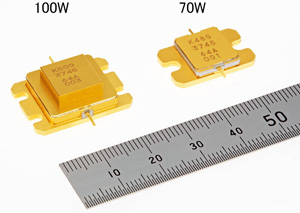- News
27 September 2016
Mitsubishi Electric expanding Ku-band GaN HEMT range to 70W and 100W to shrink satellite earth stations
Tokyo-based Mitsubishi Electric Corp is expanding its lineup of gallium nitride high-electron-mobility transistors (GaN HEMTs) to include models operating at frequencies of 13.75–14.5GHz with saturated output power of 100W (50.0dBm) and 70W (48.3dBm) for use in satellite earth stations utilizing the Ku-band (12-18GHz). Due to optimization of the transistor structure, the new 100W GaN HEMT offers output power that is reckoned to be among the highest available. Shipment of samples will begin on 1 October (70W) and 1 January 2017 (100W).
Mitsubishi Electric says that demand for satellite communications is increasing, especially in the Ku-band, which enables high-speed communication even under adverse conditions such as natural disasters and in areas where construction of communication facilities is difficult. Deployment of transmitter equipment using higher-power GaN-HEMTs has become more common in recent years, particularly in high-speed applications such as satellite news gathering.
 Picture: Mitsubishi Electric's MGFK50G3745 (left) and MGFK48G3745 (right).
Picture: Mitsubishi Electric's MGFK50G3745 (left) and MGFK48G3745 (right).
To meet this growing demand for higher output power levels, Mitsubishi Electric is hence expanding its Ku-band GaN-HEMT lineup by introducing the 100W MGFK50G3745 model and 70W MGFK48G3745 model (which both have linear gain of 10.0dB). Mitsubishi Electric notes that, due to the high output power, the need for fewer parts contributes to the miniaturization of transmitter equipment in satellite earth stations.
In addition, individual transmitter components can be configured independently during manufacture, eliminating the need for on-site configuration and shortening overall development time.
Finally, the existing MGFG5H1503 power amplifier can be used as a driver stage, leveraging the latter's linearizer device to help reduce distortion in power transmitters.
Development of the new devices was partially supported by Japan's New Energy and Industrial Technology Development Organization (NEDO).


